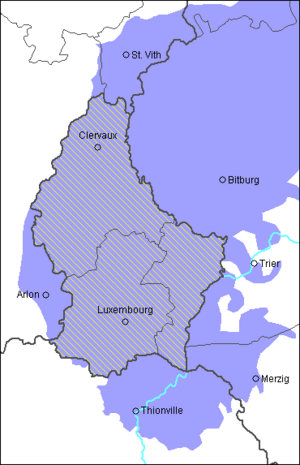Luxembourgish language facts for kids
Quick facts for kids Luxembourgish |
||||
|---|---|---|---|---|
| Lëtzebuergesch | ||||
| Native to | Luxembourg, Belgium, France, Germany | |||
| Region | Central Europe | |||
| Native speakers | 320,000 (1998) | |||
| Language family |
Indo-European
|
|||
| Writing system | Latin (Luxembourgish alphabet) Luxembourgish Braille |
|||
| Official status | ||||
| Official language in | ||||
| Recognised minority language in | Belgium (recognised by the (French Community of Belgium) | |||
| Regulated by | Conseil Permanent de la Langue Luxembourgeoise (CPLL) | |||

Area where Luxembourgish (hatched) and related Moselle Franconian is spoken.
|
||||
|
||||
Luxembourgish, also known as Lëtzebuergesch, is a language spoken mostly in the country of Luxembourg. It's a West Germanic language, which means it's related to languages like German and English. While many people in Luxembourg speak it, it's also spoken by smaller groups in nearby parts of Belgium, France, and Germany.
This language has some similarities to both German and French. This is because Luxembourg is located between these two larger countries. Even though Luxembourgish is the national language, many people in Luxembourg also speak German and French in their daily lives.
Contents
What is Luxembourgish?
Luxembourgish is a language that grew from a group of German dialects called Moselle Franconian. Over time, it developed its own unique features and became a separate language. In 1984, Luxembourgish was officially recognized as the national language of Luxembourg.
Where is Luxembourgish Spoken?
The main place where Luxembourgish is spoken is, of course, Luxembourg. This small country is in the heart of Europe. You can also find people speaking Luxembourgish in some areas of Belgium, especially near the Luxembourg border. Some people in parts of France and Germany also speak it.
How is it Similar to Other Languages?
Luxembourgish shares many words and grammar rules with German. This is because they both come from the same language family. However, Luxembourgish has also borrowed many words from French. This mix makes it a unique language. For example, you might hear French words used in Luxembourgish sentences.
Why is Luxembourgish Important?
Luxembourgish is a very important part of Luxembourg's culture and identity. It helps people feel connected to their country and their heritage. Even though many people in Luxembourg speak other languages like French and German for work or school, Luxembourgish is often used at home and among friends.
Language in Daily Life
In Luxembourg, you'll hear Luxembourgish spoken in many everyday situations. It's used in shops, on the street, and in local government. Road signs and public announcements often use Luxembourgish. However, because French and German are also widely used, you might see signs or hear announcements in those languages too.
Learning Luxembourgish
For young people in Luxembourg, learning Luxembourgish is a key part of their education. Schools teach the language, helping new generations keep it alive. There are also efforts to help newcomers to Luxembourg learn the language, so they can feel more at home.
Images for kids
-
Sign in Luxembourgish indicating the way to walk through a shop during the COVID-19 pandemic
See also
 In Spanish: Idioma luxemburgués para niños
In Spanish: Idioma luxemburgués para niños
 | Anna J. Cooper |
 | Mary McLeod Bethune |
 | Lillie Mae Bradford |




